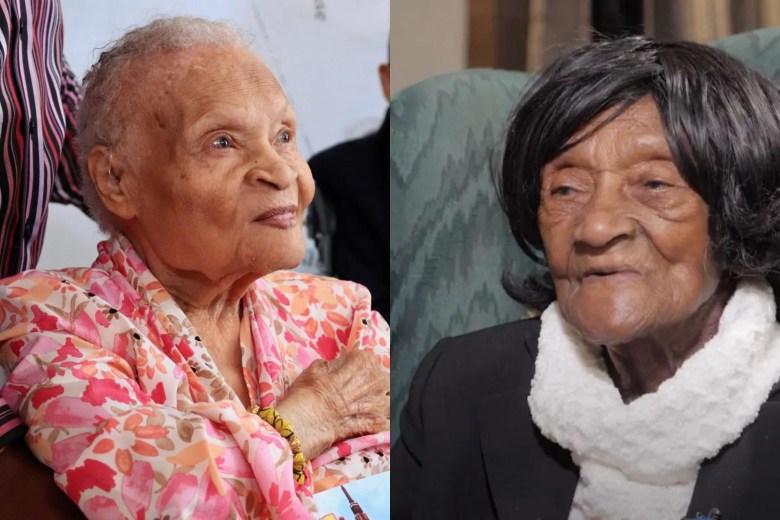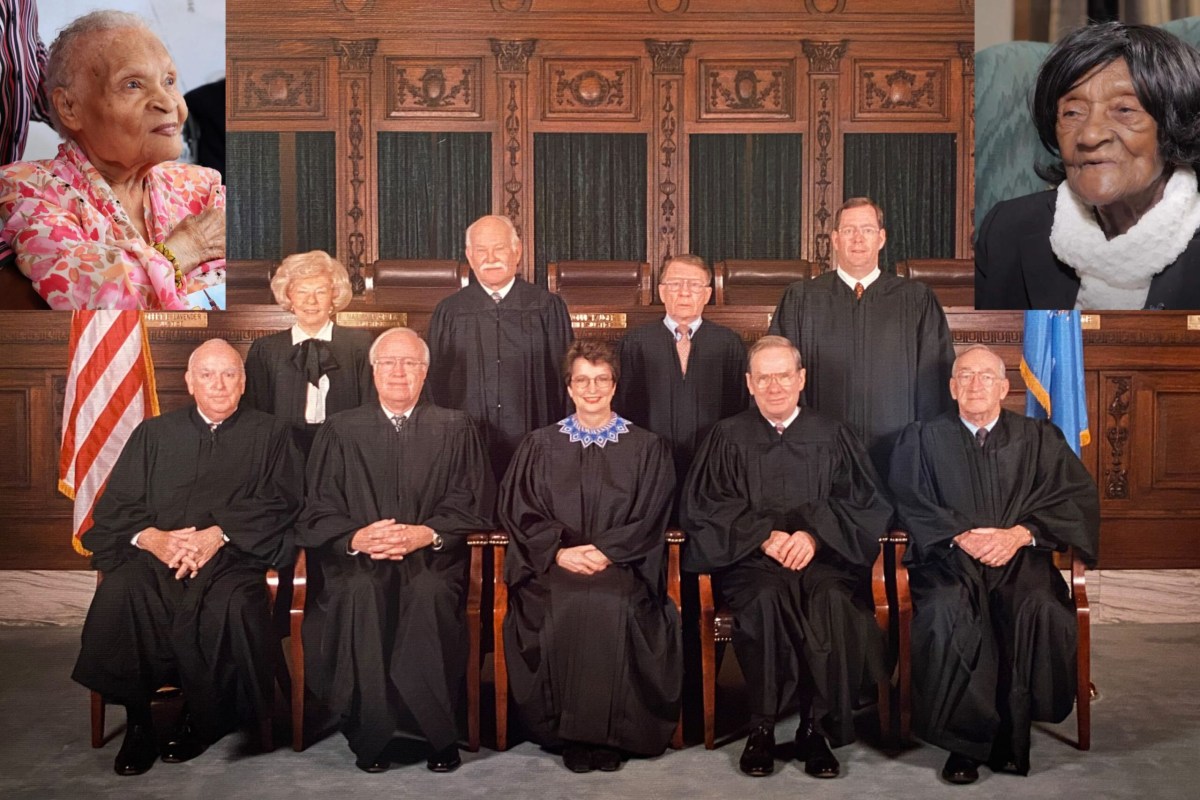|
Listen to this article here
Getting your Trinity Audio player ready...
|
GREENWOOD Dist.–The Oklahoma Supreme Court has scheduled oral arguments for the two last known living survivors of the 1921 Tulsa Race Massacre in their appeal seeking reparations for the 103-year-old government-sanctioned racial domestic terror attack.
The oral arguments will take place on April 2, 2024 at 1:30 p.m. at the Oklahoma Supreme Court, according to a court filing posted on Tuesday. The chamber is located on the second floor of the Oklahoma State Capitol.
The defendants include: the City of Tulsa, Tulsa Regional Chamber, Tulsa County Board of Commissioners, Vic Regalado in his official capacity as Tulsa County Sheriff, and the Oklahoma Military Department (National Guard.)
“Mother” Viola Ford Fletcher and “mother” Lessie Benningfield Randle, both 109, have testified in front of U.S. Congress, the Oklahoma Legislature and international human rights groups. Yet, they’ve never had the opportunity to testify in an Oklahoma court. On April 2, that changes.

“We appreciate the Oklahoma Supreme Court’s swift attention to our case following an unlawful dismissal,” Justice for Greenwood civil rights attorney Damario Solomon-Simmons said.
Survivors Seek Reversal of Lower Court Dismissal
The historic decision to allow oral arguments comes after Tulsa County District Judge Caroline Wall dismissed the case in July, 2023. Less than a month later, attorney Solomon-Simmons and New York-based international law firm Schulte Roth & Zabel filed an appeal.
In September, the state’s highest court took up their appeal. Notably, supporters of the survivors worry the state seeks to wait out the clock until they pass away. Those concerns grew after the death of survivor “Uncle Red” Hughes Van Ellis, Fletcher’s little brother, in October.

However, the Oklahoma Supreme Court’s decision to allow oral arguments moves the legal issue of reparations in Tulsa further than at any time in the last century.
“Our hope is that the Justices of Oklahoma Supreme Court will act swiftly in the pursuit of justice, honoring the resilience of Mother Randle and Mother Fletcher while they are still with us,” Solomon-Simmons said.
Oral Arguments: What Survivors Will Say
According to Tuesday’s court filing, the survivors will have 30 minutes to provide oral arguments. Justices will have the ability to ask questions during the arguments.
Attorneys for the survivors plan to make two oral arguments in April. First, they’ll ask the Oklahoma Supreme Court to reverse Judge Wall’s decision to dismiss the public nuisance claim which underpins their case.
Judge Wall ruled that the survivors failed to show how the courts could remedy the harm from the Massacre, but attorneys for the survivors argue state law doesn’t require them to provide a remedy proposal before the start of a trial.
“The District Court’s conclusion that the survivors failed to state a claim under 12 O.S. § 2012(B)(6) due to a purported failure to present a legally viable abatement remedy is being challenged,” attorney Solomon-Simmons stated.

Next, attorneys for the survivors will argue the high court should reverse Judge Wall’s dismissal of their unjust enrichment claim. They’ll argue Judge Wall reneged on a previous agreement to move forward in the case.
Attorneys for survivors made a deal with the defendants to strike certain claims from their second amended petition as long as the defense agreed to not put forth anymore motions to dismiss.
Ultimately, the defense pushed for another motion to dismiss anyway, and Judge Wall passed it, dismissing the case with prejudice.
“Upon hearing the arguments of counsel and considering the briefs filed by counsel for plaintiffs and counsel for defendants the court respectfully finds and order the plaintiffs’ second amended petition should and shall be dismissed with prejudice,” Judge Wall wrote.
If the Oklahoma Supreme Court reverses the dismissal, the case goes back to Judge Wall for a trial. However, if the high court upholds the dismissal, survivors can’t file the same lawsuit again.
“It is noted that in open court, both parties had agreed that the defendants would refrain?from filing a motion to dismiss if certain allegations were removed from the survivors’ second amended petition. The survivors argue that they have met the notice pleading standard for the unjust enrichment claim,” attorney Solomon-Simmons stated.
Related Stories
- Oklahoma Supreme Court receives brief from Massacre survivors
- AG ignores facts, rejects settlement for Tulsa Massacre survivors
- Tulsa Massacre survivor Hughes Van Ellis passes away at 102
Oral Arguments: What Defendants Will Say
Attorneys of the City of Tulsa have made previous oral arguments in district court that the survivors don’t have a basis to sue simply because they were alive in Greenwood during the Massacre.
Tulsa Mayor G.T. Bynum, whose grandfather oversaw the urban renewal that led to a portion of I-244 cutting Greenwood in half, has said on numerous occasions he doesn’t support direct cash payments.
Meanwhile, Oklahoma Attorney General Gentner Drummond is a moderate Republican who is defending the Oklahoma Military Department against the lawsuit. In an October 2023 court filing responding to the Oklahoma Supreme Court’s decision to hear the appeal, AG Drummond argued the survivors’ claims were “stale,” a legal term meaning out of date.
“…their Amended Petition still failed to allege how the Oklahoma Military Department, who were activated only to quell the riot and left after their mission was accomplished in 1921, continues to harm them today,” Assistant AG McClure stated.
The AG’s office plans claims the Oklahoma National Guard did nothing to harm residents of Greenwood during the Massacre. However, oral accounts and records from the Tulsa Historical Society reveal guardsmen were slow to protect Black people and their property but quick to arrest and march Black people to interment camps at locations across the city.
“Guardsmen assisted firemen in putting out fires, took African Americans out of the hands of vigilantes and imprisoned all Black Tulsans not already interned. Over 6,000 people were held at the Convention Hall and the Fairgrounds, some for as long as eight days”
Tulsa Historical Society
During the 100-year commemoration of the 1921 Tulsa Race Massacre, then-Oklahoma National Guard commander Michael Thompson, the state’s first Black commander, gave an apology on behalf of the department.
“We can debate what the guard did 100 years ago, but there’s no room for debate for what the guard did not do. And what the guard didn’t do is protect this community,” Thompson said.
How to watch live proceedings on April 2, 2024
The Oklahoma Supreme Court, which first began allowing livestreams in 2017, will livestream the oral arguments for the survivors and defendants. The videos will be made public by a link on the Oklahoma State Courts Network.
Meanwhile, the Terence Crutcher Foundation and Justice for Greenwood will organize bus rides from Tulsa to the Oklahoma State Capitol for the hearing on April 2nd. To sign up for a ride, click here.
For a direct link to the case on OSCN, click here.



Excellent. Age does matter. Despite all the allowances and so forth, it was mentioned the age of the litigants. For ages nearing the century mark, two months is one more day closer to the grave. I hope the OK court did not exploit this avenue.